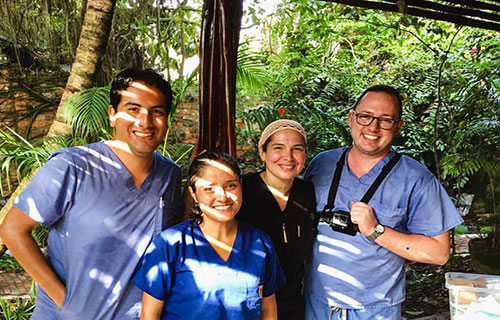Untreated dental caries in permanent teeth is the most prevalent disease, and dental caries of the primary teeth affect more than 530 million children. Oral diseases manifest as pain, impairment, and loss of function, and can affect individuals throughout their lifetime. At the most extreme end of the socioeconomic spectrum, growing populations of marginalized individuals worldwide reside in slums. Iquitos, Peru, is the largest city in the Peruvian Amazonian rainforest, and due to recent immigration into the city from the surrounding jungle, lack of housing has resulted in floating structures built on the Amazon River. Unfortunately, due to such precarious housing and poor environmental conditions, residents of these communities experience chronic illnesses, vector borne and infectious diseases, exposure to severe storms and flooding, and lack of water, sanitary infrastructure, and access to food.
 In 2017, a collaborative group from the University of Washington (UW) schools and departments of Dentistry, Civil and Environmental Engineering, Environmental and Occupational Health, Global Health, Landscape Architecture, Neurology, and Nursing teamed up with the Centro de Investigaciones Tecnológicas Biomédicas y Medioambientales (CITBM), the Universidad Nacional de la Amazonía Peruana (UNAP) and the Instituto Nacional de Salud (INS) in Peru and developed a transdisciplinary action research program, InterACTION Labs, to design and implement research projects aimed at advancing the health, community strength, and future development of residents of one of these informal river communities – the Community of Claverito. As a contributor to InterACTION Labs, dental faculty collected information about the community’s oral health status and the impact of oral health on the residents’ quality of life. The purpose of this study was twofold: 1) to describe the prevalence and distribution of dental caries among the pediatric and caregiver populations of a slum community located on the Amazon River in Iquitos, Peru; and 2) to evaluate the relationships between the children’s dental health status and the OHRQoL of the children and the impact on their families.
In 2017, a collaborative group from the University of Washington (UW) schools and departments of Dentistry, Civil and Environmental Engineering, Environmental and Occupational Health, Global Health, Landscape Architecture, Neurology, and Nursing teamed up with the Centro de Investigaciones Tecnológicas Biomédicas y Medioambientales (CITBM), the Universidad Nacional de la Amazonía Peruana (UNAP) and the Instituto Nacional de Salud (INS) in Peru and developed a transdisciplinary action research program, InterACTION Labs, to design and implement research projects aimed at advancing the health, community strength, and future development of residents of one of these informal river communities – the Community of Claverito. As a contributor to InterACTION Labs, dental faculty collected information about the community’s oral health status and the impact of oral health on the residents’ quality of life. The purpose of this study was twofold: 1) to describe the prevalence and distribution of dental caries among the pediatric and caregiver populations of a slum community located on the Amazon River in Iquitos, Peru; and 2) to evaluate the relationships between the children’s dental health status and the OHRQoL of the children and the impact on their families.
The results of this study reveal poor oral health status for the children and caregivers and an association between child dental health status and family quality of life. The prevalence of untreated child dental caries was 97%, with only six children having filled teeth and only eight children having missing teeth. A significant positive association was observed between child decayed and filled teeth scores and family impact scores. Significant associations were also observed between child decayed and filled teeth scores and caregiver age and child scores and caregiver decayed and filled teeth scores. Collectively, these results indicate a high level of dental disease and limited access to dental care.
There are an estimated 90,000 people living in riverine slum communities in Iquitos that could benefit from an increase in oral health services. Policy changes to improve availability and access to oral health services are needed to achieve better health for informal communities like the one of Claverito.
